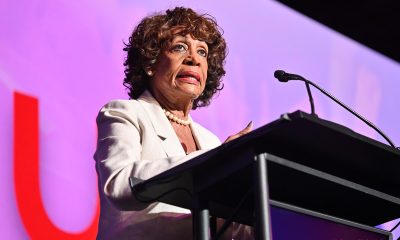Politics
Vice-President & local leaders discuss reproductive rights & Prop 1
The Vice-President has brought together leaders from across the nation who are fighting to protect reproductive health care & abortion access
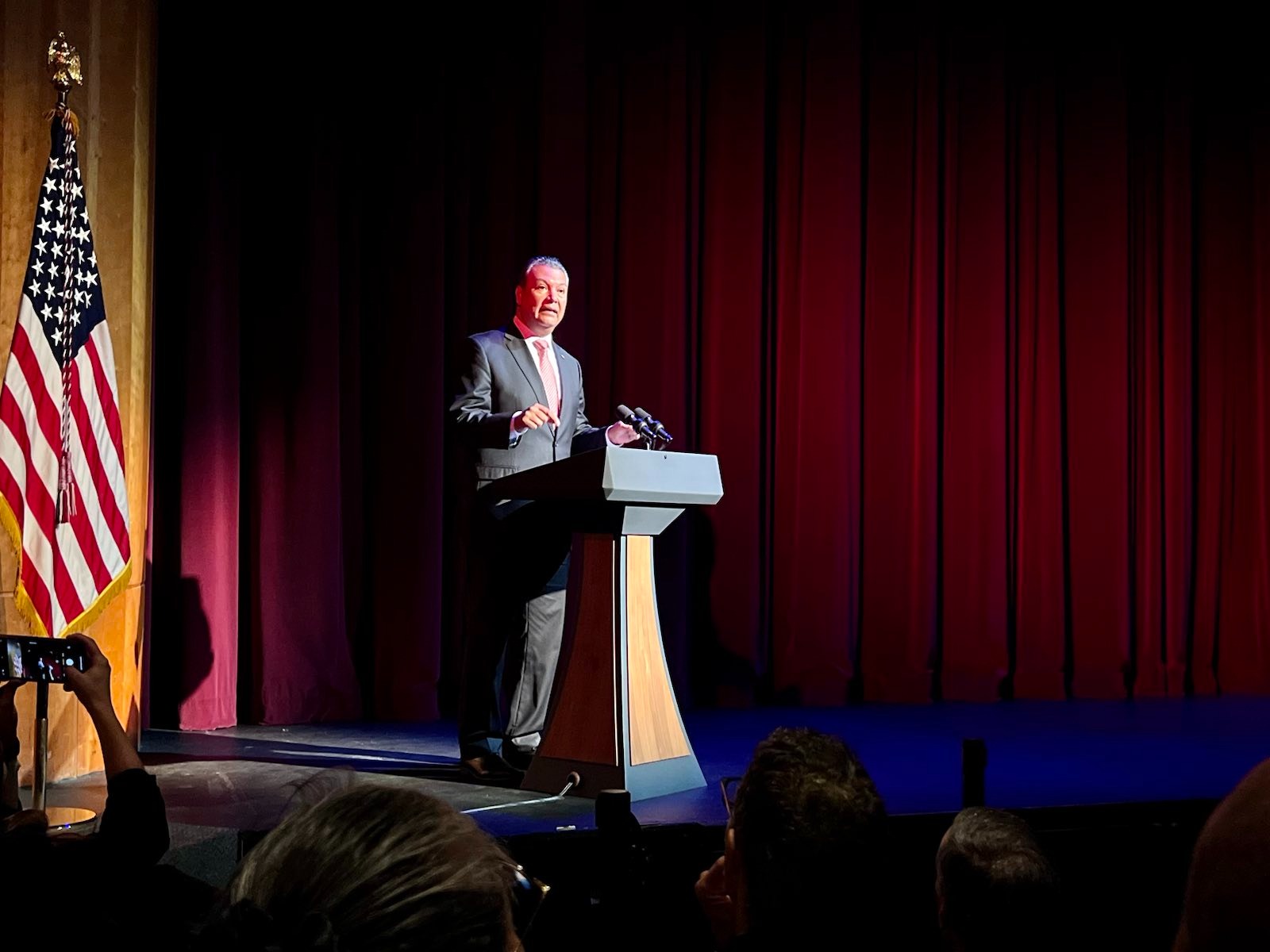
LOS ANGELES – Mayor Eric Garcetti opened an event Monday afternoon which was organized as a conversation about protecting reproductive rights and the need for passage of Proposition 1, a California Ballot Proposition and State Constitutional Amendment that, if approved by voters, would establish a Constitutional right to reproductive freedom in California.
The event, facilitated by Vice-President Kamala Harris at the Nate Holden Performing Arts Center in LA, included discussions and remarks from Los Angeles mayoral candidate Rep. Karen Bass (D-CA-37), Celinda Vázquez, Vice President of Public Affairs for Planned Parenthood Los Angeles, U.S. Senator Alex Padilla (D-CA), Director Melanie Fontes Rainer, the Office of Civil Rights, U.S. Department of Human Health & Services
California Attorney General Rob Bonta and California’s Senate President pro Tempore State Senator Toni G. Atkins, were also in attendance.
Sen. Padilla highlighted California’s leadership in protecting a woman’s right to choose and Proposition 1, which will appear on the November ballot in California and would codify the right to abortion access in the state constitution.
Padilla also raised the alarm about the increasing number of Republican state legislatures working to claw back women’s reproductive rights and the need to act urgently to stop them by codifying the right to an abortion into federal law.
“Abortion is a fundamental right in America,” said Senator Padilla. “While in California, the right to an abortion is currently safe, the worst thing we could do is grow numb to this crisis. For years, Republicans in Congress and in state legislatures have worked to strip away the reproductive rights of women across the country—and in June they got their wish. That’s why we must continue to grow our Democratic majorities so we can prevent a national abortion ban. We won’t give up the fight to codify Roe, and protect once and for all the right to an abortion.”
Rep. Karen Bass introduced and welcomed Celinda Vázquez, Vice President of Public Affairs for Planned Parenthood Los Angeles, on stage. Bass then praised Harris’ leadership and welcomed Harris on stage. Bass and Harris hugged. Bass, Vázquez and Harris then sat down to discuss abortion.
The Vice President highlighted the administration’s efforts to preserve access to abortion and reproductive healthcare. HHS contacted pharmacies to describe “their legal requirement to administer medication as prescribed,” Harris said, and that DOJ has a task force to pursue “whatever litigation is appropriate.”
“This is about freedom and liberty,” Harris said. “22 days, there is an election, that is a fact. We need to hold on to what we have, and we need two more senators,” Harris said adding, “We’re going to have to protect these rights by having national legislation,” Harris said. “We need people in Congress to recognize that responsibility.”
The Vice-President has brought together leaders from across the nation who are on the frontlines fighting to protect reproductive health care and abortion access. Earlier this month, she traveled to Connecticut and Texas to participate in conversations with reproductive rights leaders, she chaired the Second Meeting of the Interagency Task Force on Reproductive Healthcare Access, and she convened student leaders at the White House.
Since May, she has held more than 20 convenings and met with 180+ state legislators from 18 states to discuss protecting reproductive rights. The Vice President has also convened health care providers, constitutional law experts, faith leaders, state attorneys general, disability rights leaders, higher education leaders, students, and advocates.
Proposition 1 will appear on the November 8 General Election Ballot for California Voters. It was authored by the President Pro Tempore of the California State Senate, Toni Atkins, D-San Diego and co-authored by the Speaker of the California State Assembly, Anthony Rendon, D-Lakewood.
Proposition 1 is a direct response to the June 2022 Supreme Court of the United States (SCOTUS) decision in Dobbs v. Jackson Women’s Health Organization, overturning the 1973 Roe v. Wade decision, ruling that the Constitution of the United States does not confer a right to abortion.
Watch the conversation here:
Transcript: Remarks by Vice President Harris in a Conversation on Protecting Reproductive Rights
REPRESENTATIVE BASS: How was that? How was that for a welcome home?
THE VICE PRESIDENT: It is good to be home. It’s good to be home.
REPRESENTATIVE BASS: Well, we love having you in L.A. Absolutely. So, why don’t we get right to it? This is an important moment in the time of our fight for rights. So, tell us what it is like for you to be championing this issue? How has it been? I read off all of the meetings, all of the state legislatures. You’re going around the country. What’s it feel like?
THE VICE PRESIDENT: It’s a combination of feelings that I think we all have about this. And when I’m traveling the country, one of the feelings that I hear most is fear. It’s fear.
But I’ll tell you, you know, here’s how I think about it: You know, people have asked me, “Well, what has caused you to focus a large part of your work on…” — as you said — “…the health, safety, and well-being of women and children?”
And, as you know, I was raised by a mother who had two goals in her life: to raise her two children — my sister, Maya, and me — and to end breast cancer. She was a breast cancer researcher, a scientist.
And so, from my earliest days of life, I remember my mother being so passionate about women’s health and access to health, and it was always grounded, so much of her work, in the importance of women having dignity in the healthcare system — in the healthcare delivery system and — and having rights and having power over the decisions that were being made so that it would be theirs to make, whatever it was.
And that’s how I was raised. I mean, you know, I was raised hearing the phrase “mammary gland” all the time. It was — it was just a common word in our household.
And so, when I think about this issue and this fight right now, it’s an extension of that. And so, to your point, I have been traveling the country in so-called red states and so-called blue states, talking with leaders on the ground — in particular a lot of state-elected leaders, legislators — about what we can do collectively to build up support for what we need to do, which is to empower women and restore their rights on this issue.
But it’s — really, it’s — it was unthinkable, I think, for so many of us. We knew it might happen, but let — I mean, let’s just pause for a moment. The highest court in our land, the United States Supreme Court, just took a constitutional right that had been recognized from the people of America, from the women of America.
And if I may, I would like to put it in context to how I feel about this in the context of being Vice President. So, as Vice President, in the last a year and a half, I have, as of now — my staff has counted — I have now met directly or by phone with 100 world leaders, presidents, prime ministers, chancellors, kings. And here’s what I think we all know about what those experiences are like: The United States — we, as Americans — can walk in those rooms with a certain level of authority —
REPRESENTATIVE BASS: That’s right.
THE PRESIDENT: — chin up, shoulders back — to talk in those rooms about the importance of democracy, the importance of rule of law, the importance of human rights. And in that way, we have held ourselves out to be and have been considered a role model on these matters.
But what we, as role models, all know is that when you are role model, people watch what you do to see if it matches what you say.
And the point then is a realization that this issue is not only directly impacting the people of America, but when we think about autocratic governments around the world who can then look to their people and say, “Well, you want to hold up America and rights as an example of what we should do? Well, look at what they just did.” So, by extension, what just happened will invariably impact women around the world.
REPRESENTATIVE BASS: That’s right.
THE VICE PRESIDENT: So, there’s a lot of fear. But also, as we all know, we know how to fight.
REPRESENTATIVE BASS: Oh, yeah.
THE VICE PRESIDENT: Because when you know what you stand for, you know what to fight for. (Applause.)
REPRESENTATIVE BASS: Celinda.
MS. VÁZQUEZ: We do know how to fight. So, what steps is the administration taking to protect reproductive rights?
THE VICE PRESIDENT: So, well — and, first, can I just say, it’s so good to be with the two of you on this stage? It’s so good to be home.
MS. VÁZQUEZ: So good.
THE VICE PRESIDENT: Celinda, you have been such an extraordinary fighter. You and I’ve been in many of these rooms together in these past many, many months. And I cannot thank you enough for being on the ground and the courage that it takes for our frontline folks, like you, to do what you are doing. And to all of those who are here on the frontline, I applaud you. Let us applaud them. (Applause.)
Because around the country and here, it is not without risk that you do what you do.
To Madam Congresswoman — (laughter). It’s not a political event, I know. (Laughs.) You — you and I have worked together for so many years when I was AG and you were at the capitol — at the state capitol, and then in Washington, D.C.
You are a courageous, fearless fighter on so many of these issues. And, in particular, what you have done throughout your career to be a strong voice for women, for children, for all communities, for the coalition: I thank you. And it’s an honor to be on the stage with you as well. (Applause.)
And so, what we are doing as an administration is a number of things. Through the Health and Human Services agency, led by a Californian, Secretary Xavier Becerra — (applause) — we are — we’ve been actually sending out a number of things that are really intended to make sure that there’s clarity in the midst of the confusion.
And one of the things that HHS did that I think is very significant is sent out to pharmacies information about their legal requirement to administer medication as prescribed. And — and I also applaud that agency for also having announced that they will investigate where there are any violations of the rules of conduct on that issue.
The Department of Education has been extraordinary. Secretary Cardona has been doing some important work around making sure that that we protect students and their reproductive rights, including their ability to take leave from school for whatever reproductive healthcare they need, and make sure that there’s no discrimination in that regard.
The Department of Justice has been coordinating with a number of agencies as appropriate but has also set up, for example, a process of eliciting pro bono hours, because there are going to be so many folks who are on the ground doing the work who are not sure of the legal risks that they are taking in these various states.
They’ve also set up a task force, led by Vanita Gupta, who is a great civil rights lawyer, and they are pursuing whatever litigation is appropriate.
Also, through the Department of Justice, they’ve set up a hotline for providers, so there is an ability to report threats and things of that nature.
The FCC and the FTC are doing — the Federal Trade Commission, and the Federal Communications Commission — are doing important work to, one, check with the biggest providers to see what their privacy policies are and their data retention policies are. And that’s extremely important.
I think I have a website here, but I’ll tell you that the — that they’ve also set up a number for people to issue complaints and to register complaints around privacy violations, which is a big issue, because, of course, there are an assortment of mobile apps that folks use to monitor their menstruation cycle. There are mobile apps that folks use to just get directions to go to a facility to get their healthcare, and we want to make sure that that information is not being violated.
So, that is the kind of work that’s happening through our administration.
The President has signed two executive orders that relate to making a very clear statement that we intend to protect and defend the right that people have for travel and for access to emergency healthcare.
The VA is doing great work, in terms of the number of women who are veterans, in ensuring that they will be able to have access to all of the care that they require — including the Department of Defense, because — think about it, if you’re a servicemember — and there are at least 300,000 women, I believe, who are in active service right now — you don’t have any choice where you’re deployed and could very well be deployed to a state where it’s been rendered illegal.
REPRESENTATIVE BASS: Right.
THE VICE PRESIDENT: And so, they’re working through what they can do to ensure that the servicemembers are not subject to — to those kinds of threats to their healthcare and their independence.
REPRESENTATIVE BASS: Well, you know, Madam Vice President, this is kind of on the same lines of that. I’m wondering what kind of stories you might be hearing from people.
You know, in another life, I worked in healthcare. I’ve worked in the emergency room and also in primary care. Every now and then, you hear a story in the news like a woman — a woman that has an ectopic pregnancy; or the 10-year-old girl; or a woman who is — if she carries the pregnancy to term, might not live. As you’ve gone around the country, are you hearing stories like that?
THE VICE PRESIDENT: I am hearing those stories. And those are the stories that are the public stories. But as you and I know, what we’re hearing about only is just a fraction of what’s actually happening. Many of you know: As a former prosecutor, the bulk of my career as a prosecutor, I was focused on violent — crimes of violence against women and children, and, in particular, I specialized in child sexual assault cases.
The vast majority of those cases are not reported. And the idea that laws would be passed, as it relates to people who have endured and survived such violation and violence, and to then say to them, “And you will also not have autonomy over your body on this issue” — it’s immoral. It’s immoral.
As a former prosecutor having handled those cases, I can tell you the vast majority of those cases are not reported for a variety of reasons that have to do with the nature of it all, including it might be about a family member, it might be about someone who otherwise could harm that person or their family.
And what’s happening in these states on that and so many other related issues is abhorent: punishing women, criminalizing healthcare providers. In fact, I’m going to — I don’t know if everybody in the audience can see this.
(The Vice President holds up a map.)
This is a map of the United States. So, you don’t need to see — you don’t need to read the words to see the point that I’m going to make.
So, you see all the different colors. So, one of the colors on this map is — represents the states in which abortion is banned from conception with no exceptions. One color is abortion banned from conception with an exception for rape, but not incest. Another, banned from conception with exceptions for rape and incest. There’s a 6-week ban on here, a 15-week ban, an 18-week ban. You get the point.
REPRESENTATIVE BASS: Not incest?
THE VICE PRESIDENT: Absolute —
MS. VÁZQUEZ: No.
THE VICE PRESIDENT: But absolute confusion —
REPRESENTATIVE BASS: Yeah. That’s (inaudible).
THE VICE PRESIDENT: — which also creates an environment that is ripe for misinformation, disinformation, and predatory practices.
REPRESENTATIVE BASS: Yeah.
THE VICE PRESIDENT: So, in addition to what I’m seeing around the country, there’s fear. There’s also just absolute and utter confusion about what are — for any individual: What are my rights? And that is something that, we as opinion leaders, of which there are so many here, we have to continue to use our voice and our platform in a way that informs people about their rights with an — with a full appreciation that it’s so confusing they may not be aware.
MS. VÁZQUEZ: So, you’ve touched upon this, but how else do you see the fight for reproductive freedom impacting the everyday lives of Americans?
THE VICE PRESIDENT: (The Vice President reaches for the map.)
MS. VÁZQUEZ: Right, so —
THE VICE PRESIDENT: (Laughs.) So, okay.
MS. VÁZQUEZ: — just a little expansion.
THE VICE PRESIDENT: I love Venn diagrams. Okay? (Laughs.)
MS. VÁZQUEZ: Just a little expansion.
THE VICE PRESIDENT: I really do. I love Venn diagrams — you know, the three circles — sometimes there are more.
So I asked my team, “Do — do me a Venn diagram on — from which states are we seeing attacks on reproductive healthcare, voting rights, LGBTQ+ rights.” You would not be surprised to know that there is a significant overlap. Right?
So that’s what — so when we talk about who’s being impacted, well, you know, if you read the Dobbs decision — or you don’t need to, I’ll just tell you — Clarence Thomas said the quiet part out loud: They’re coming for the right to conception, the right to marry the person you love.
But I do see in, then, this moment, another thing in that Venn diagram, which is the reminder about the importance of coalition building, of bringing together all those folks who have been fighting forever on reproductive healthcare and maternal mortality, something that Karen Bass has been a leader on, bringing together the folks that have been fighting forever on voting rights, bringing together all the folks who — who are responsible for the victory on marriage — but we still have so much more work to do — and building our coalition.
Because here’s the thing: There was a movement that was started generations ago that culminated in Roe v. Wade. We are now the ones that are responsible for picking up that movement. And as with any movement in our country that has been about progress and the expansion of rights, one of the most productive ingredients of those movements has been the coalition and our commitment to building that coalition and growing it, for a number of reasons, one is that we all have so much more in common than what separates us. But the other is, almost everyone should understand what rights of theirs are subject to and now exposed to attack.
And on this point — my final point on this would be, we need to take back the flag on this. Because this is absolutely about freedom and liberty.
REPRESENTATIVE BASS: Yes.
THE VICE PRESIDENT: This is about freedom and liberty, which are foundational notions for the existence of our country. These are founding principles that we, as Americans, hold dear: freedom and liberty. And that means all of us are susceptible.
REPRESENTATIVE BASS: And for freedom and liberty, we need to hold on to the House and the Senate, I’m just saying. (Applause.)
THE VICE PRESIDENT: So, it’s not a political event, but that doesn’t mean we don’t speak truth. (Laughter.)
So, in fact, so, 22 days, there’s an election.
REPSENTATIVE BASS: Yes.
THE VICE PRESIDENT: That’s a — that’s a fact. It is a fact that there is a bill in Congress that the congressmember was a part of leading — the Women’s Health Protection Act — which would codify, which means put into law, the protections of Roe v. Wade.
The Court took it away; Congress can put it back.
The President of the United States — our President, Joe Biden, has said he will not let this thing called the “filibuster” get in the way of signing that law. All of those are facts.
It is also the fact that, in order for that bill to get to the President’s desk so he can sign it into law, we need two more senators. We need to hold on to what we have, and we need two more senators. That is a fact.
It is also fact, by the way, that in that same context, the President has said he will sign into law the John Lewis Voting Rights Advancement Act. (Applause.)
Two more senators.
REPRESENTATIVE BASS: I could think of two. (Laughter.)
You know, along with this, in terms of, you know, understanding that the Dobbs decision was about the right to privacy and, Madam Vice President, you know, I’m not a lawyer, but I do wonder, like: How far could they go?
I mean, you know, Jim Crow laws? I mean, could business say, “Well, it’s my right to only allow certain people to come in”? How far — what are the implications?
THE VICE PRESIDENT: I mean, I think you should — that everything that you can imagine, you should assume is possible.
It was unimaginable that the court of Thurgood Marshall would do what this court just did.
REPRESENTATIVE BASS: Right. Right.
THE VICE PRESIDENT: And — and that’s, again, why I think that the point that you made about, you know, who is vulnerable to this moment: Everyone is vulnerable to this moment.
And we just — we have to understand that, I think, in so many ways, we are living in unsettled times.
You think about it on the global stage, there is a war in Europe. You know, for 70 years, there was an assumption that, in spite of the differences among nations, that there was still certain international rules and norms, including the importance of sovereignty and territorial integrity. But with Russia’s unprovoked aggression in Ukraine, we see that we can’t necessarily take that for granted.
Unsettled times. Unsettled times.
The Voting Rights Act, guided by the United States Supreme Court in Shelby v. Holder, a decision they rendered in 2013, and then you look at what happened in 2020, which is historic numbers of people voted in the midst of a pandemic, including an historic number of young voters, and almost immediately thereafter — because that scared people —
REPRESENTATIVE BASS: Right. (Laughter.)
THE VICE PRESIDENT: — there are children here — they started passing laws making it illegal to give people food and water if they’ve been standing in line for hours to vote; passing laws making it intentionally more difficult for people to vote. Unsettled times.
We thought the issue of voting rights had been settled.
Unsettled times. In this year of our Lord 2022, taking away a woman’s ability to make decisions about her own body.
So, I think we have to listen to the words of Coretta Scott King. You’ve heard me paraphrase her so many times on this. She famously said: The fight for civil rights — which is the fight for justice, it’s the fight for equality, fight for freedom — the fight for civil rights must be fought and won with each generation.
REPRESENTATIVE BASS: Yes.
THE VICE PRESIDENT: Because let’s always remember that these rights will not be permanent if we are not prepared to be vigilant.
And in that way, this is so much about a democracy. I think about democracy in this regard. I think — I think of democracy as there’s a duality to it, in that, when it is intact, it is strong in terms of what it does to create a system that preserves and fights for rights, civil rights, human rights. So, there’s an aspect to it that is about strength in terms of what it can do to lift people up.
On the other hand, it’s very fragile. It’s extremely fragile. It will only be as strong as our willingness to fight for it. And so, fight we will.
MS. VÁZQUEZ: You have touched upon many of these topics, but how are you seeing the intersection of attacks on — well, no, I think we already — we already did that.
But we have an expert here — our congresswoman worked on the floor — a maternal morbidity expert, and all of the things. What — what is the administration doing to address the maternal mortality crisis, which, we know, we you’ve done a lot of work previously?
THE VICE PRESIDENT: Thank you, Celinda. Maternal mortality — and, again, I recognize and thank Karen Bass for her work as a leader on this for so many years.
In America today, Black women are three times more likely to die in connection with childbirth. Native women, twice as likely. Rural women, one and a half times likely. And as it relates to, for example, the experience of Black women, it is unrelated to their educational level or their socioeconomic level. It is very clear it literally has to do with the fact that when she walks into that clinic or that doctor’s office or that emergency room, she is not taken as seriously.
And so, there is a lot of work that needs to happen that also understands and appreciates that, for so many of these women — for example, women in rural America — are living in the midst of healthcare deserts. There’s no hospitals. I — I have somebody that’s very close to me whose relative just died, just weeks ago, in connecti- — during childbirth, and the baby died, in rural America. Because there was nowhere, where she lived, to get her the kind of care that the complication required. Right?
So, this is a big issue. But the idea that in this country, at this time, it is still such an issue of the proportion.
And so, there are a number of things. One, when I was in the Senate, we had a bill that would address the bias in the healthcare delivery system and require training of healthcare providers — of all types of healthcare providers. And I wrote into it, in particular, that the trainers would include doulas, who — (applause) — yes — who provide some of the best care and could teach a few things to others.
We are doing the work as an administration of — you know, I’m very proud of this — we have lifted this issue up to the stage of the White House, actually convened a group of leaders to come to the White House to present on this issue.
We have done the work of also extending in states Medicaid coverage and encouraging, in extension — can you believe? Okay, so Medicaid — (applause) — Medicaid covers, but we’re changing this — only two months of postpartum care. Two months.
REPRESENTATIVE BASS: You better not have a problem.
THE VICE PRESIDENT: You just gave birth to a human being.
REPRESENTATIVE BASS: Right?
THE VICE PRESIDENT: So, there is — so we’re extending it to 12 months — right? —
REPRESENTATIVE BASS: Excellent. That’s great.
THE VICE PRESIDENT: — for all that that requires and it requires, you know, the details of pelvic examinations. It requires the details of whatever kind of healthcare that might be, you know, in any level of the body. Healthcare — for mental healthcare, physical.
And so, this is some of the work we are doing, and — and it’s a good start. There’s more work to be done, also recognizing that the disparities exist based on also lack of access to transportation, lack of access to all types of healthcare, in addition to maternal healthcare. Because there is so much of this that also can be attributed to unique stressors, right?
Take, for example, the fact that poverty is trauma inducing. And what that might mean, in terms of the unique stressors that low-income women are facing that can have an impact on their pregnancy.
And so, all of this work is being done by our administration in conjunction with the Congress. We have the “Momnibus” — we called it the “Momnibus.” An omnibus bill.
REPRESENTATIVE BASS: Yes. Yes, that’s great.
THE VICE PRESIDENT: And we —
REPRESENTATIVE BASS: That was a great effort. Members of the Congressional Black Caucus that led that effort.
THE VICE PRESIDENT: Exactly.
REPRESENTATIVE BASS: You know, when you were talking about maternal mortality, especially amongst Black women, when Beyoncé and Serena Williams get into trouble —
THE VICE PRESIDENT: Right?
REPRESENTATIVE BASS: — when they’re in the delivery room, we know this is a huge problem.
THE VICE PRESIDENT: That’s exactly right.
REPRESENTATIVE BASS: The idea that you have high rates of maternal death in the United States of America is an outrage in and of itself.
How about a few words on contraception, in terms of what the administration has done?
THE VICE PRESIDENT: Well, we have done some good work in terms of making clear that there is a right to contraception.
But, you know, I mean, to your point about what’s at risk, they pulled it back, but you saw what happened with the University Idaho — right? — which was — which was the issue was that the university — they pulled it back, so it’s no longer the case — but had essentially said that they would not provide contraception at the university.
And you mentioned earlier that the convenings that I’ve been doing, one of them was with university presidents. And I brought them in because, of course, they’re — the 18- through 24-year-old population is most at risk on this issue.
REPRESENTATIVE BASS: Right. That’s right.
THE VICE PRESIDENT: And I brought them in and asked them, “Well, what’s your plan?”
REPRESENTATIVE BASS: (Laughs.) And they said?
THE VICE PRESIDENT: And it was a good and productive meeting.
MS. VÁZQUEZ: What did they say?
REPRESENTATIVE BASS: (Inaudible.)
THE VICE PRESIDENT: It was a (inaudible) meeting.
But, you know, for example, “What’s the plan?” And I’ve just recently convened a bunch of extraordinary college student leaders, just in the White House, in my office, last week. Just brilliant. They’re brilliant. They’re so good. Like, the future of our country is so bright if they’re leading. And — and — (applause) — yes.
And so, they — but we were talking about — for example, universities, colleges, community colleges, any, you know, educational institutions for educating after high school — what are they doing about privacy protocols as it relates to their health clinics?
What are they doing as it relates to absenteeism, because they may be in a state where she has to go to another state to receive her abortion care?
What are they doing in terms of — many universities, for example, will have — this might not be the right word — but bereavement funds, right? So if a student has a death in the family and they can’t afford the transportation, that there’ll be assistance with that.
Well — well, maybe we should be considering the fact that there are going to be students who can’t afford to leave the state and pay tuition and pay for books and pay for dorms, right? And how are they thinking about that approach?
And so those issues have come up. In connection also has been the issue of contraception and what are they doing to ensure that they are complying with the law but, at the same time, doing everything they can to fulfill a right that their students have.
REPRESENTATIVE BASS: Well, Madam Vice President, I know you have so many places to go. We would love to keep you here all day. So we want you to come back again soon.
THE VICE PRESIDENT: Of course.
REPRESENTATIVE BASS: But maybe you can share some final thoughts. Final thoughts about today, where you’re going, where you been.
THE VICE PRESIDENT: Well, a few things. You know, one of the — you know, the additional facts — if we don’t have the issue in California, we have an — we have extraordinary members of Congress. Mayor Garcetti is here. Rob Bonta, the Attorney General. Alex Padilla, the senator. Toni Atkins, who convened a bunch of state legislators for a previous meeting that I did in San Francisco.
But elections matter on this one, as with everything else. When I’m traveling the country, I remind folks: Elections matter in terms of who your local prosecutor is. If you’re in a state that has criminalized this, that matters.
Who your governor is matters. Governor Newsom has done an extraordinary job on this. Because it’s going to be about whether, depending on the composition of their legislature, do they need to veto stuff that would be bad and restricting rights, or are they going to sign legislation that is about preserving and expanding rights where they’ve been taken away in particular.
And so, 22 days. And the reality of it is that we’re going to have to protect these rights ultimately by having national legislation.
And there’s only one path to getting there. There’s only so much that the executive branch can do on this. We have three coequal branches of government. The Court has acted, and now we need Congress to act. And so we need people in Congress to recognize that responsibility.
So I’d urge everyone to just remember that and to talk with your friends and your neighbors, in particular in states where these rights are being attacked, and to remind them.
And then my last point would be just to repeat: I think the coalition-building piece on this is so extraordinarily important. You know, this is an intergenerational movement. This is a movement among so many people who are allies, who are — who are in this together for so many reasons.
So let’s just stay committed to it all and know that this moment was meant for those of us who are here to recognize we cannot afford to throw up our hands on this; we got to roll up our sleeves.
Thank you all. (Applause.)
REPRESENTATIVE BASS: Roll up our sleeves! Thank you. Thank you so much. It’s an honor to have you here. Thank you.
MS. VÁZQUEZ: Gracias, Madam Vice President.
Congress
Padilla speaks at ‘ICE Out for Good’ protest in D.C.
ICE agent killed Renee Nicole Good in Minneapolis on Jan. 7
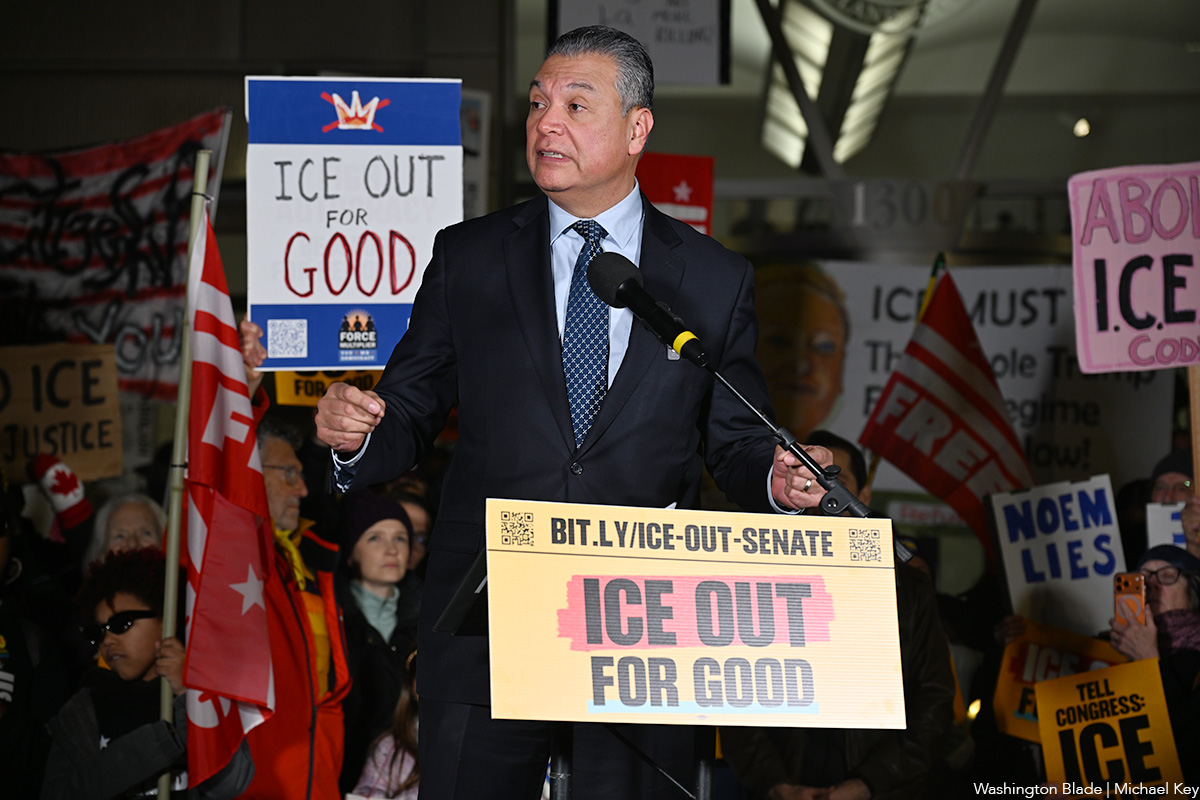
U.S. Sen. Alex Padilla (D-Md.) is among those who spoke at an “ICE Out for Good” protest that took place outside U.S. Customs and Border Protection’s headquarters in D.C. on Tuesday.
The protest took place six days after a U.S. Immigration and Customs Enforcement agent shot and killed Renee Nicole Good, a 37-year-old woman in Minneapolis.
Good left behind her wife and three children.
(Video by Michael K. Lavers)
Politics
LGBTQ Democrats say they’re ready to fight to win in 2026
Queer leaders warn Democrats not to abandon trans people
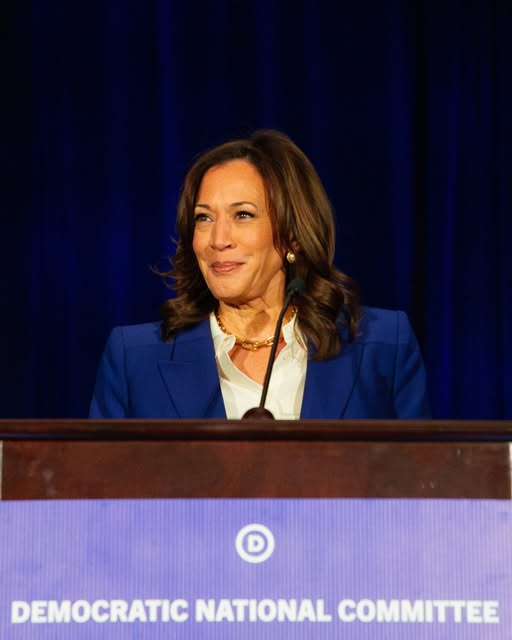
The Democratic National Committee held its annual winter meetings in Downtown Los Angeles over the weekend, and queer Democrats showed up with a clear message for the national organization: Don’t abandon queer and trans people.
Following last year’s disastrous presidential and congressional elections, many influential pundits and some powerful lawmakers called on Democrats to distance the party from unpopular positions on trans rights, in order to win swing districts by wooing more conservative voters.
But members of the DNC’s LGBTQ Caucus say that’s actually a losing strategy.
“There are still parts of our party saying we need to abandon trans people in order to win elections, which is just not provable, actually. It’s just some feelings from some old consultants in DC,” LGBTQ Caucus Chair Sean Meloy says.
Some national Democrats are already backtracking from suggestions that they walk back on trans rights.
California Governor Gavin Newsom grabbed national attention in March when he suggested that it was “deeply unfair” for trans girls to play in women’s sports. But last week, he doubled down on support for trans rights, claiming to have signed more trans-rights legislation than any governor in the country, and entering into feuds on X with Elon Musk and Nicki Minaj over his support for trans kids.
Democrats are also clearly feeling the wind in their sails recently after major election victories in Virginia and New Jersey last month, as well as victories in dozens of local and state legislative elections across the country in 2025.
“[Abigail] Spanberger in Virginia didn’t win by dodging the trans question. She won by attacking it, confronting it, and that’s how she got ahead,” says Vivian Smotherman, trans activist and at-large member of the DNC’s LGBTQ Caucus.
“Trans people are not a problem. We are a resource,” Smotherman says. “For my community, surviving into adulthood is not a guarantee, it’s an accomplishment. You don’t walk through a survival gauntlet without learning things… I’m not begging the DNC to protect my community. I’m here to remind you that we are the warriors tempered by fire, and we are fully capable of helping this party win.”
At its own meeting on Friday, the LGBTQ Caucus announced several new initiatives to ensure that queer and trans issues stay top of mind for the DNC as it gears up for the midterm elections next year.
One plan is to formalize the DNC’s Trans Advisory Board as distinct from the LGBTQ Caucus, to help introduce candidates across the country to trans people and trans issues.
“One in three people in this country know a trans person. Two-thirds of Americans don’t think they do,” Smotherman says. “So the real problem is not being trans, it’s that you don’t know us. You cannot authentically support a trans person if you’ve never met one.
“That’s why my first goal with this Trans Advisory Board is to host a monthly Meet a Trans Person webinar. Not as a spectacle, as a debate, but as a human connection, and I will be charging every state chair with asking every one of their candidates up and down the board if they know a trans person. And if that person doesn’t know a trans person, I’m gonna have that state chair put them on that webinar.”
The LGBTQ caucus is also opening up associate membership to allies who do not identify as LGBTQ, in order to broaden support and connections over queer issues.
It’s also preparing for the inevitable attacks Republicans will throw at queer candidates and supporters of LGBTQ issues.
“These attacks are going to come. You have to budget money proactively. You have to be ready to fight,” Meloy says. “There are some local party chairs who don’t want to recruit LGBTQ candidates to run because these issues might come up, right? That’s an absolutely ludicrous statement, but there are still people who need support in how to be ready and how to respond to these things that inevitably come.”
“The oldest joke is that Democrats don’t have a spine. And when they come after us, and we do not reply, we play right into that.”
Meloy also alluded to anti-LGBTQ tropes that queer people are out to harm children, and said that Democrats should be prepared to make the case that it’s actually Republicans who are protecting child abusers – for example, by suppressing the Epstein files.
“They are weak on this issue. Take the fight, empower your parties to say, ‘These people have nothing to stand on,’” Meloy says.
Politics
George Santos speaks out on prison, Trump pardon, and more
Not interested in political comeback: ‘I made so many poor choices’

It has been just over two years since George Santos — the disgraced politician who once represented New York’s Third District — was expelled from Congress. Now, Santos is breaking his silence about his expulsion, imprisonment, subsequent pardon, what he believes he did wrong, and allegations regarding immigration fraud.
In 2022, Santos was elected to represent the Long Island communities of North Hempstead, Glen Cove, and Oyster Bay, one of the wealthiest congressional districts in the United States. This week, he sat in the lobby of the Hyatt Capitol Hill, just blocks from his former office in the Cannon House Office Building, to speak with the Washington Blade about how he became the center of one of the most outrageous political scandals in modern U.S. history. Despite the media scrutiny surrounding his lies, criminal convictions, and eventual pardon by President Donald Trump, Santos appeared relaxed during the interview, speaking freely about his experiences, admissions, and grievances.
Scope of Santos’s misconduct
Many journalists have struggled to verify George Santos’s personal history and professional resume. Numerous claims he made during his campaigns have been debunked or walked back, particularly regarding his personal and professional history since 2020.
Santos gained media attention for claiming Jewish heritage despite being raised Catholic and identifying as Catholic. He said his maternal grandfather grew up Jewish, converted to Catholicism before the Holocaust, and raised his children Catholic. Investigations, however, show his maternal grandparents were born in Brazil, not Ukraine or Belgium. Santos described himself variously as “Jew-ish,” “half Jewish,” a non-observant Jew, a “proud American Jew,” and a “Latino Jew.”
He also misrepresented his mother’s professional history, claiming she was “the first female executive at a major financial institution.” Records, including her 2003 visa application, show she had not been in the U.S. since 1999 and listed her occupation as a domestic worker.
Santos further fabricated his educational history, claiming a bachelor’s degree in finance and economics from Baruch College, where he said he graduated near the top of his class. Investigations revealed he never graduated. He also falsely claimed an MBA from New York University on official campaign documents — a misrepresentation that later became grounds for his expulsion. Santos later blamed the lies on a local Republican Party staffer.
His professional claims were also fraudulent. Santos called himself a “seasoned Wall Street financier and investor” and claimed to have worked for Citigroup and Goldman Sachs. Both companies reported no record of his employment. When pressed, Santos admitted he had used a “poor choice of words,” eventually describing his experience as “limited partnerships.” He also falsely claimed to have lost four employees in the 2016 Pulse nightclub shooting in Orlando; no victims had any connection to companies listed in his biography.
Santos misrepresented his residences during his 2020 campaign. He listed an Elmhurst, Queens, address outside the district he sought to represent, later moving with his partner to a Whitestone rowhouse. He was registered to vote at the Whitestone address but did not live there.
When asked about his lies, Santos told the Blade he wishes he did everything differently.
“Everything, everything, everything,” Santos told the Blade. “I made so many poor choices that I think it would be redundant to not say everything.”
He did not fully take responsibility, describing the scandals as a mix of personal ambition and what he called a “sensational political assassination.”
“Ambition is a toxic trait, and unfortunately, I was consumed by that. I forewent everyone else’s [considerations]… I had no consideration for anything around me other than myself, and that’s awful,” he added.
In addition to personal history fabrications, Santos made numerous false claims the Department of Justice later treated as campaign finance fraud. He solicited donations through a fake political entity, diverted funds into an LLC he controlled, and disguised personal expenditures as legitimate political expenses, using donations for luxury purchases.
Santos denied wrongdoing, stating, “I didn’t steal people’s credit cards… I didn’t go shopping at Hermes and Onlyfans. It’s not true either.”
He defended some purchases as campaign-related, singling out House Ethics Committee Chairman Michael Guest.
“The only two luxury brands that you’ll see of purchases in my campaign were Ferragamo and Tiffany. [I got] Ferragamo for the [male members of the] Republican steering committee when I was lobbying for my seat committee and three Tiffany pens for the females … That’s where those are legal expenses. They’re very legal.”
The House Ethics Committee found “substantial evidence” of lawbreaking, stating Santos “fraudulently exploited every aspect of his House candidacy,” using campaign funds for luxury shopping, cosmetic procedures, travel, and rent.
“I had a choice to not straw donate to my campaign, and I chose to, yeah, that was a poor choice,” Santos admitted. “Of course, I’m guilty for that. Was I forthcoming in the GOP with the party? No, I was not. I was very dishonest with the GOP, and for that I regret, and I also regret that the GOP in New York created an environment that made somebody like me feel it was needed to do that. But I regret not being forthcoming and honest about it.”
Santos also collected pandemic unemployment payments of approximately $24,000 while employed.
He was charged with multiple federal offenses, including conspiracy to commit offenses against the United States, wire fraud, making materially false statements to the FEC, falsifying records, aggravated identity theft, access device fraud, money laundering, and theft of public funds. Santos pleaded guilty to wire fraud and aggravated identity theft and was sentenced to 87 months in prison in April 2025, ordered to pay hundreds of thousands in restitution and forfeiture. He was released from the Federal Correctional Institution in Fairton, N. J., following Trump’s pardon in October.
Immigration fraud allegations

In addition to the professional and personal claims Santos has made that have been proven false, he also addressed allegations of immigration fraud raised by the Washington Blade. A source familiar with Santos’s history with U.S. immigration proceedings described several alarming allegations, most notably a reportedly fraudulent marriage to his former wife, Uadla Viera, to help her obtain U.S. immigration status. Santos has adamantly denied wrongdoing.
According to the source, who spoke to the Blade on condition of anonymity, Santos married Viera in a civil ceremony in Manhattan in 2012, despite neither living in the city. There are no known photos, announcements, or records of a wedding celebration, engagement, bridal party, shower, or honeymoon. This unusual lack of documentation stands out for Santos, whose life and actions are typically geared toward media attention.
While the source questioned the motive behind the marriage, Santos insisted it was legal and not done for any nefarious purpose.
“I married a person who was legally in this country, and all in all, what I did was kind of skip the line for her. And we were married, and there was no financial benefit [for me]. We were married. We had bills together. There’s no proof or evidence of a financial benefit other than jaded people again, anonymously, lying saying ‘He got paid. He offered me money.’ First of all, I don’t even have the wherewithal for that. Second of all, we went through a very rigorous — fucking rigorous — immigration litmus test, house interviews, multiple layers of interviews, a consummate marriage that was very obvious for anybody who was around us, and then I ended up cheating for now, obvious reasons.”
In 2013, the source said Santos dated Leandro Bis, a Brazilian tourist, while still married to Vieira. Santos denies this, framing the period as tumultuous and asserting that he was merely helping someone in need who now falsely alleges more. Bis told ABC News in a 2023 interview that Santos had “promised the world” to him while they dated.
“I’ve never dated a Leandro,” Santos told the Blade. “I can’t believe that six months of my life are common stories in the New York Times. This lunatic is going on TV and putting himself out there…I look so much better than him, and I’m much older than him. I mean life does numbers on people, because hate is a virus.”
The source further recounted Santos’s interactions with Greg Morey-Parker, a former roommate of Santos’s who told CNN that he was suspicious of Santos’s academic resume and stories of family wealth.
“Greg Morey-Parker is not a boyfriend– nowhere near a boyfriend,” Santos told the Blade. “He was actually a homeless Starbucks barista that I felt bad for. Let him crash in my living room. … He accused me of stealing his Burberry scarf. You’re homeless and you have a Burberry scarf? Bro, make up your fucking mind.”
In 2014, Santos met Pedro Vilarva, 18, on Tinder and dated him for a year while still married to Viera. According to the source, the trio socialized frequently: Santos and Vilarva with other gay men, Viera with heterosexuals. That same year, Santos filed a family-based immigration petition for Viera, who was granted conditional permanent residency. Santos publicly celebrated his engagement to Vilarva in a Facebook post at La Bonne Soupe, a Manhattan restaurant, though the relationship eventually ended. That Facebook post has since been deleted.
Santos maintains he was honest with both immigration authorities and his spouse.
“I was honest with immigration authorities, 100% above board. I was honest with my spouse, as far as my relationship with him and with my ex-wife, so much I’m the one who told her, I’m sorry we can’t do this anymore. I’m seeing Pedro. And she knew Pedro, it was a shit show. Okay? I’m gonna leave it at that, out of respect to both her and Pedro … I cheated on my first wife, and that was a whole story on its own.”
Later in 2014, Santos met Morey-Parker, who told the Daily Beast that Santos advised him to marry an immigrant woman from Brazil to make money. Santos denied that claim to the Blade.
“That is Gregory again making more shit up and there’s no proof or evidence or anything that you can point to,” Santos said.
Viera became a permanent resident in 2017, according to previous media reports, and in 2018 gave birth to a daughter. Santos did not claim paternity or seek custody. Santos and Viera were granted an uncontested divorce in 2019. Viera became a U.S. citizen in 2022 and purchased a $750,000 home in New Jersey, according to the Blade’s source and to the official deed of the property.
Santos did not mention that he had been married or divorced during his congressional campaigns until an internal vulnerability study commissioned by the campaign identified it as a potential issue for voters.
Santos downplayed all of this, saying it was a running joke among his staff. “I would be a joke. I would allude to it [and say] ‘Ladies, look, I love you guys, but there’s a reason that I don’t date women anymore, and I’m divorced from my first wife.’ It was like a running joke, making light of it and self-deprecating humor, which is my favorite kind of humor.”
He claimed that the New York Times story was the reason he became more sensitive with posts related to his ex-wife.
“The reason it’s not [visible] today is because I pulled it all off because of privacy issues. It was all archived for my Instagram, but if you had access to my Instagram prior to the New York Times story, you would see I never deleted my pictures with her…They were all over my Instagram, going to the beach, like everything. It’s like our entire life was documented together.”
On Trump, politics, and public office
Santos was tight lipped when the Blade questioned him about his conversations with President Trump.
“You never, ever share a lick of a word you exchange with the sitting president of the United States, no matter who that person is… I’ve seen it backfire for people who did it with Biden, with Trump, with Obama. I’m not about to make that mistake. Yeah, my conversations with the president are private.”
He did say that he was humbled by Trump’s pardon but regrets ever entering politics.
“I had such a good life, and to have to be at the place I am today is indicative of, you know, politics is really for the elites…I’m so uninterested in politics these days…I want to get involved in policy change, but not politicking.”
He said he is not interested in a position in the Trump administration.
“I would respectfully decline [any government job], I would say thank you from the bottom of my heart, and say ‘I’m probably not best suited for a job in government.’ I want nothing to do with the government or public office.”
Trans and LGBTQ issues

Santos also spoke on his experience as both a member of the LGBTQ community and a Republican legislator. Most notably, he doesn’t think there is any barrier for gay people to join the Republican Party, citing his ascent into Republican leadership as an example.
He defended his record as a gay Republican, noting the continued election and reelection of LGBTQ members of Congress and emphasizing that he disproved stereotypes about Republicans.
“There’s no bigotry in the Republican Party. It’s a matter of how you present yourself…I’m not saying there’s no anti-gay sentiment, I’m pretty sure there is, but I never experienced it.”
He continued, explaining how far-right figures gaining prominence within Republican circles sets off some tension.
“I know it exists… I mean Nick Fuentes exists, right? His followers go on my social media, and either call me a Jew or a homo all day long. But I’m proud of it. I’m proud that I was the first who didn’t conceal the fact that he’s gay, and still got elected by a constituency of Republicans in a landslide victory.”
It is important to note that Santos is the first openly LGBTQ non-incumbent Republican to be elected to Congress, not the first openly LGBTQ Republican to win an office. Santos won his seat with 53% of his district’s vote while his opponent, Robert Zimmerman, got 46%.
Santos spoke on his experience as a gay man, echoing other LGB Republicans who have distanced themselves from transgender rights.
“This is very controversial for me, but I don’t loop my issues in with the trans community issues. I’m a gay man. I’m gender conforming. I’m he/him/sir.”
He continued, saying all he can speak on is his experience as a gay man, which doesn’t inherently lend him to being a champion for transgender rights, unlike many other LGB elected officials have done.
“I’ve never walked in the shoes of a trans person, so I can’t speak for them.” Santos framed his stance on gender-affirming care carefully: “I believe those people deserve the right to treatment, and that’s fair. I don’t believe in a mass agenda of pushing children towards that. I think we need to have a sensible conversation of, let’s allow kids to get to a certain age, right? Let’s allow adults to make those decisions, not children…for permanent decisions like hormone blockers and puberty blockers…that should be with adults.”
This is despite general medical consensus that views gender-affirming care as medically necessary, appropriate, and potentially life-saving for trans youth. The American Medical Association, the largest medical association in the country, opposes state laws that interfere with or ban gender-affirming care, calling such actions harmful and contrary to medical evidence.
Prison experience
Santos also spoke explicitly about what he says are dehumanizing conditions at FCI Fairton, something that has given him a new passion following his release from the facility.
“It’s punitive and dehumanizing,” he said when describing the situation he was in.
“Black mold bubbling all over the ceiling. Rat infestations… Listeria and ringworm outbreaks. Expired food… Underwear with skid marks… either wear that or don’t wear underwear.”
He continued, emphasizing the dehumanizing treatment he says he received, and hoping it will lead to prison reform.
“Solitary confinement for 41 days. Three showers a week. One 15-minute phone call every 30 days. [The warden] an absolute vicious human being. … We need to rehabilitate people. Just make it humane.”
Santos hinted at a future in media and activism, particularly related to prison reform, signaling that while he has stepped away from public office, he may still seek to influence policy and public discourse.
Despite his dramatic fall from political grace, Santos remains unapologetically in the public eye. From allegations of fraud to his prison experience and ongoing controversies, he presents a portrait of a man both shaped by — and defiant of — the consequences of his actions. Whether the public views him as a cautionary tale, a redeemed figure, or something in between, Santos’s story continues to provoke debate about accountability, ambition, and the limits of political power in America.
Politics
Honoring Stonewall: A conversation with Senator Toni Atkins on the past, present, and future of Pride
As we commemorate the 50th anniversary of the Stonewall Uprising, the Stonewall Democratic Club honors leaders like Senator Toni Atkins, whose lifelong commitment to equality and public service reflects the enduring legacy and ongoing promise of Stonewall
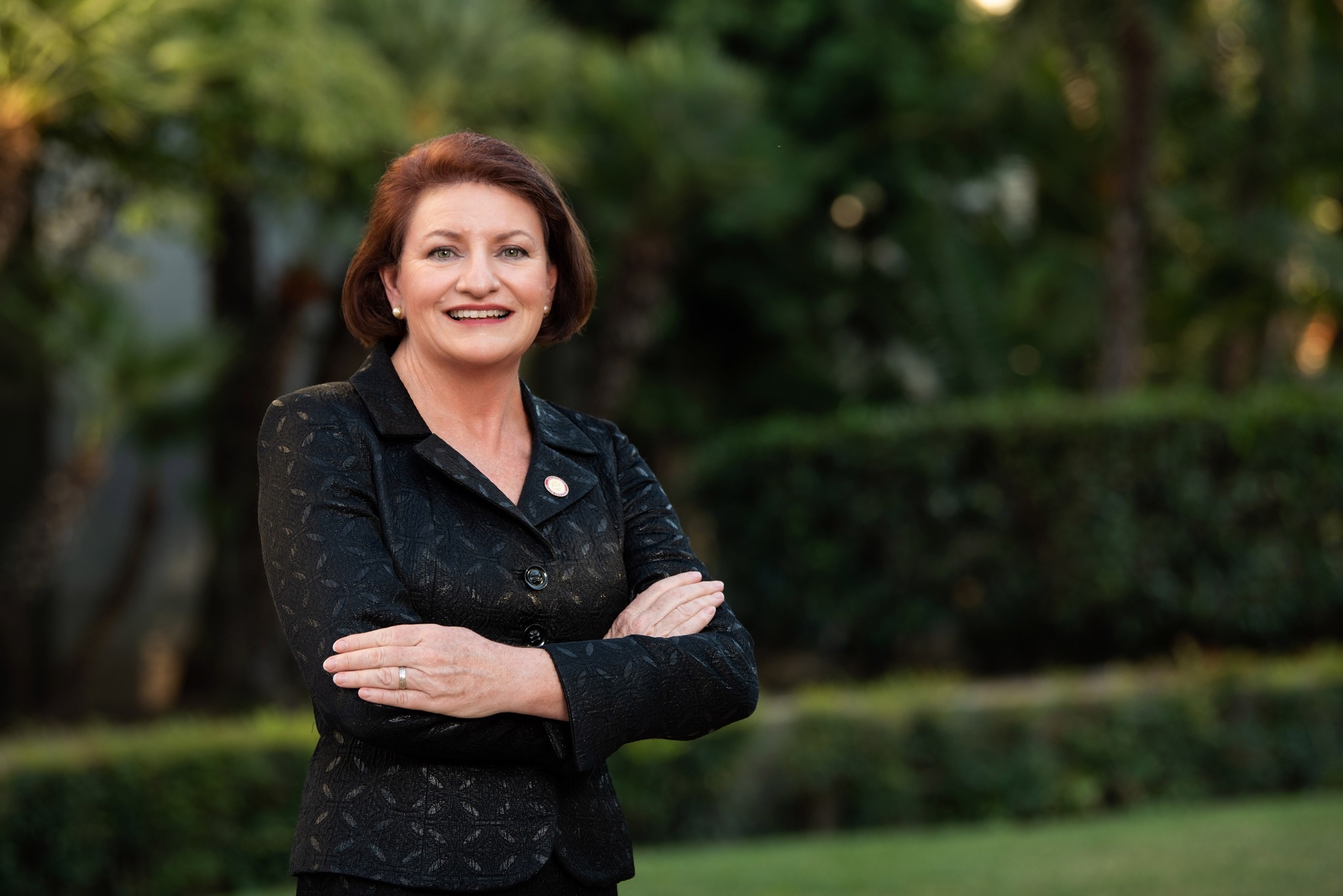
As we rapidly approach the 50th anniversary of the Stonewall Uprising – an inarguably paramount moment that fueled a national movement for LGBTQ civil rights – the Stonewall Democratic Club continues to carry into the future the spirit of that rebellion through advocacy and political action. This milestone also provides our community with an opportunity to reflect on the leaders who have carried that spirit forward, including Senator Toni Atkins, whose decades of public service have been shaped by a resounding commitment to equality and representation of marginalized communities. Her journey, from growing up in rural poverty to becoming one of California’s most impactful legislative leaders, embodies the progress made since Stonewall and the work that still lies ahead for us.
As our community and our country approach the 50th anniversary of the Stonewall Uprising, how does that milestone resonate with you personally, politically, or otherwise?
Personally, I came out at age 17 in a very conservative rural community. I didn’t see other people like me, and I didn’t believe society was built for someone like me. So I am simply grateful to have been part of our movement for civil rights for my LGBTQ+ community. Politically, we have made tremendous gains, and we now face a very intentional and serious backlash. Our work and political engagement are more important than ever.
In your opinion, what do you believe was the most significant achievement that came from Stonewall? What unfinished business do we still have to work on?
The most significant achievement was visibility – seeing our collective strength for the first time.
Today, we must fight to regain the ability to serve openly in the military, protect marriage equality, and hold our hard-won ground. We must continue educating allies and families about the lives and experiences of nonbinary and transgender community members. In many ways, we are refighting some of the same battles.
We also have to work in partnership with other marginalized communities on issues beyond civil rights – income inequality, access to healthcare (including gender-affirming care), educational opportunities, and affordability. The struggle for justice is interconnected.
How do you view the connection between the activism of that time in our country and the modern policy work of the California Legislature?
Activism and organizing were essential then, and they remain essential today. We still have to strategize, organize, and take action. That hasn’t changed.
You have had a long and devoted career in public service in California. What first inspired you to get into politics? How have your own experiences as a queer woman shaped your journey along the way?
Our stories – every one of them – matter. My history has shaped every policy issue I’ve worked on. I grew up in a working-poor family. My parents, three siblings, and I lived in a four-room house with no indoor plumbing. We carried water from a nearby spring to drink, cook with, and bathe. We lacked consistent healthcare. My father was a lead miner; my mother worked as a seamstress in a factory.
Coming out as a lesbian at a young age was another defining part of my story. All of this influenced my work on housing, healthcare, LGBTQ rights, the environment, and labor protections. I saw firsthand how the mines destroyed the environment, how little safety, benefits, or protections my father had, and how families like mine struggled. Much of my political work has been about empowerment – for myself, my family, and others facing similar obstacles.
I entered politics by helping my mentor, Christine Kehoe, get elected to the San Diego City Council in 1993 – the first openly LGBTQ candidate elected to that body. Working with her at City Hall showed me the difference we could make when we had a seat at the table. That was my motivation – not only for the LGBTQ community but for all marginalized communities, working families, and women. I am forever grateful to Chris for giving me a chance to serve.
What moments in your legislative or leadership roles shine brightest in your mind as being most impactful to you?
So many- the Gender Recognition Act, Proposition 1, which I authored to enshrine abortion and contraception into the California Constitution, and Proposition 3, which did the same for marriage equality. The Earned Income Tax Credit (EITC) for working individuals and families. Creating a permanent source of funds for affordable housing. The California Dream For All downpayment assistance loan for people to buy their first home. Support for funding Prep and for community clinics and Planned Parenthood. Increased funding for childcare for working families and increased paid family leave! So many issues and so much good can be done through public policy and budget actions. That is the importance of the political work of the LGBTQ community and our allies!
As the former Speaker and as President ProTem – I have had the ability not just to sit at that table but to actually set the agenda. I’m grateful and honored for the opportunity.
Over the years you have spent in politics, how has your sense of “why I do this work” evolved, particularly in relation to our queer community and broader social justice aims?
I have seen how strategy, organizing, fundraising, and activism empower us to influence policy and budget decisions rooted in shared values. Relationships also matter – the ones we build, the conversations we have, and the listening we do. Those connections make us better and more effective.
Decades ago, we relied heavily on allies because we didn’t have seats at the table ourselves. We must never forget that. There is no shortcut for the crucial, ongoing conversations needed to continue advancing equality.
How would you describe the state of queer rights and representation in California today?
California’s values – in the public and in the Legislature – largely reflect strong support for our community. Still, especially regarding trans rights, we must keep engaging allies and others about who we are as nonbinary and transgender individuals. That is the next frontier of our civil-rights journey.
And our LGBTQ Caucus has never been larger or more effective. Many members, as I once was, are now in positions of real power and influence, moving forward policies that support our community.
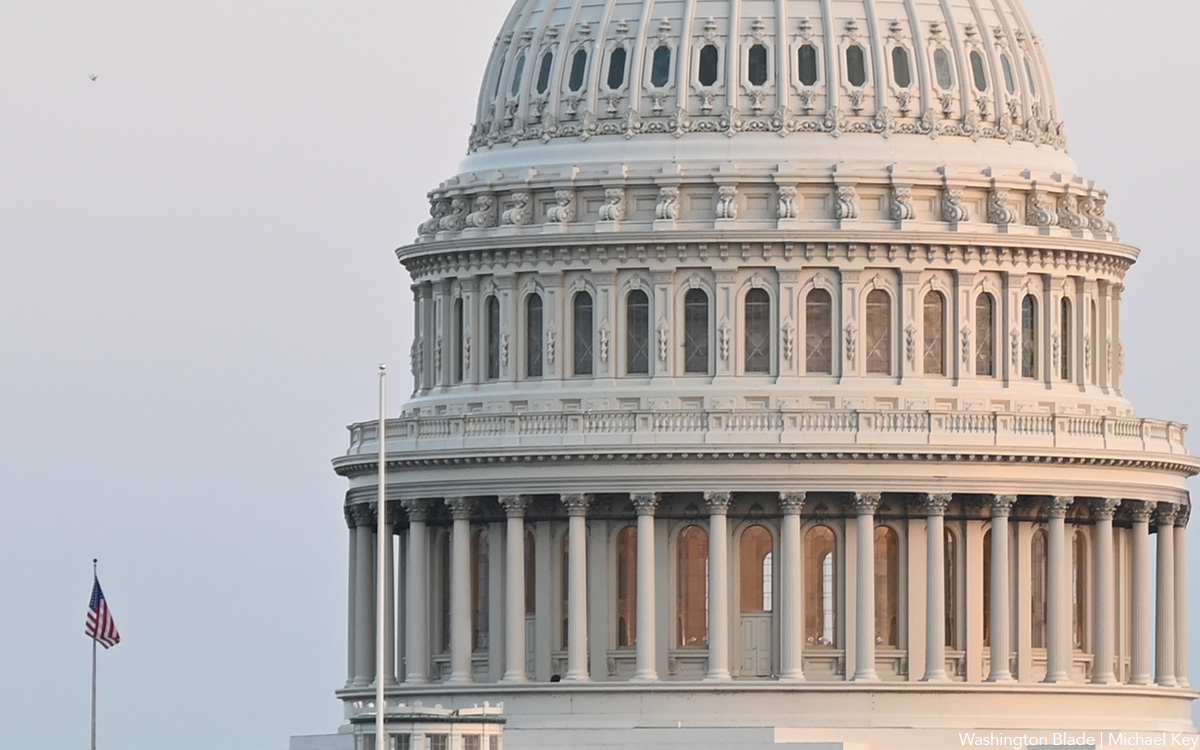
President Donald Trump on Wednesday signed a bill that reopens the federal government.
Six Democrats — U.S. Reps. Jared Golden (D-Maine), Marie Gluesenkamp Perez (D-Wash.), Adam Gray (D-Calif.), Don Davis (D-N.C.), Henry Cuellar (D-Texas), and Tom Suozzi (D-N.Y.) — voted for the funding bill that passed in the U.S. House of Representatives. Two Republicans — Thomas Massie (R-Ky.) and Greg Steube (R-Fla.) — opposed it.
The 43-day shutdown is over after eight Democratic senators gave in to Republicans’ push to roll back parts of the Affordable Care Act. According to CNBC, the average ACA recipient could see premiums more than double in 2026, and about one in 10 enrollees could lose a premium tax credit altogether.
These eight senators — U.S. Sens. Catherine Cortez Masto (D-Nev.), Dick Durbin (D-Ill.), John Fetterman (D-Pa.), Maggie Hassan (D-N.H.), Tim Kaine (D-Va.), Angus King (I-Maine), Jacky Rosen (D-Nev.), and Jeanne Shaheen (D-N.H.) — sided with Republicans to pass legislation reopening the government for a set number of days. They emphasized that their primary goal was to reopen the government, with discussions about ACA tax credits to continue afterward.
None of the senators who supported the deal are up for reelection.
King said on Sunday night that the Senate deal represents “a victory” because it gives Democrats “an opportunity” to extend ACA tax credits, now that Senate Republican leaders have agreed to hold a vote on the issue in December. (The House has not made any similar commitment.)
The government’s reopening also brought a win for Democrats’ other priorities: Arizona Congresswoman Adelita Grijalva was sworn in after a record-breaking delay in swearing in, eventually becoming the 218th signer of a discharge petition to release the Epstein files.
This story is being updated as more information becomes available.

Former Vice President Dick Cheney died of complications from pneumonia and cardio and vascular disease, according to a family statement released Tuesday morning. He was 84.
Cheney served as vice president under President George W. Bush for eight years and previously as defense secretary under President George H.W. Bush. He also served as a House member from Wyoming and as White House chief of staff for President Gerald Ford.
“Dick Cheney was a great and good man who taught his children and grandchildren to love our country, and to live lives of courage, honor, love, kindness, and fly fishing,” his family said in a statement. “We are grateful beyond measure for all Dick Cheney did for our country. And we are blessed beyond measure to have loved and been loved by this noble giant of a man.”
Cheney had a complicated history on LGBTQ+ issues; he and wife Lynne had two daughters, Liz Cheney and Mary Cheney, who’s a lesbian. Mary Cheney was criticized by LGBTQ+ advocates for not joining the fight against President George W. Bush’s push for a constitutional amendment banning gay marriage. She later resumed support for LGBTQ+ issues in 2009, including same-sex marriage, after her father left office in 2009. She married her partner since 1992, Heather Poe, in 2012.
In 2010, after leaving office, Cheney predicted “Don’t Ask, Don’t Tell” would “be changed” and expressed support for reconsideration of the law banning open military service.
In 2013, the Cheney family’s disagreements over marriage equality spilled into the public eye after Liz Cheney announced her opposition to same-sex couples legally marrying. Mary Cheney took to Facebook to rebuke her sister: “Liz – this isn’t just an issue on which we disagree – you’re just wrong – and on the wrong side of history.” Dick and Lynne Cheney were supporters of marriage equality by 2013. Liz Cheney eventually came around years later.
Cheney, a neo-con, was often criticized for his handling of the Iraq war. He was considered one of the most powerful and domineering vice presidents of the modern era. He disappeared from public life for years but re-emerged to help Liz Cheney in her House re-election bid after she clashed with President Trump. Dick Cheney assailed Trump in a campaign video and later Liz announced that her father would vote for Kamala Harris in the 2024 presidential election.
State Department
State Department’s 2024 human rights report could jeopardize LGBTQ+ asylum cases
‘Targeted and malicious act’ will ‘directly endanger lives’
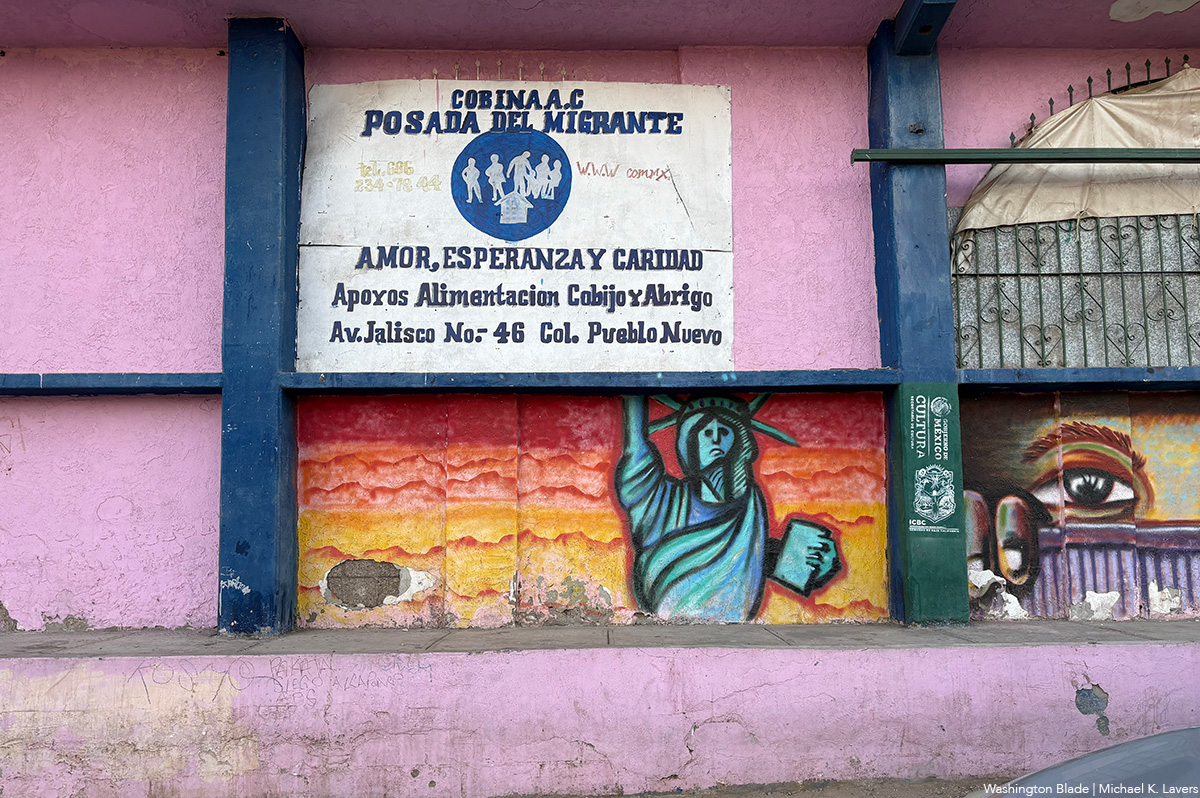
Advocacy groups say the State Department’s 2024 human rights report that “erased” LGBTQ+ people will jeopardize the cases of those who are seeking asylum in the U.S.
Immigration Equality notes the report “serve as key evidence for asylum seekers, attorneys, judges, and advocates who rely on them to assess human rights conditions and protection claims worldwide.”
The 2024 report the State Department released on Aug. 12 did not include LGBTQ+-specific references. Immigration Equality Director of Law and Policy Bridget Crawford in a statement said country-specific reports within the larger report “should be accurate, fact-based, and reflect the lived reality of LGBTQ people — not ignore and actively hide it.”
“When adjudicators see less information in these reports than in prior years, they may wrongly assume conditions have improved,” said Crawford. “In truth, the absence of reporting is a purely political move, not based in fact or reality.”
Organization for Refuge, Asylum and Migration Executive Director Steve Roth in a statement condemned the Trump-Vance administration’s “deliberate erasure of LGBTIQ communities from the 2024 human rights report — an unprecedented move that violates international standards.”
“This is a targeted and malicious act that will directly endanger lives,” he said.
Roth, like Immigration Equality, noted courts “around the world rely on these reports to evaluate asylum claims.”
“Stripping out documentation of LGBTIQ persecution removes a vital tool in assessing claims for protection, jeopardizing the ability of LGBTIQ asylum seekers to access safety,” said Roth.
Congress requires the State Department to release a human rights report each year.
The State Department usually releases them in the spring, as opposed to August. Then-State Department spokesperson Tammy Bruce, who president Donald Trump has nominated to become deputy representative at the U.N., during her last press briefing on Aug. 12 defended the delay and the report itself.
“We weren’t going to release something compiled and written by the previous administration,” said Bruce. “It needed to change based on the point of view and the vision of the Trump administration, and so those changes were made.”
Asylum courts ‘will have less credible data to rely on’
Jessica Stern, the former special U.S. envoy for the promotion of LGBTQ+ and intersex rights under the Biden-Harris administration, co-founded the Alliance for Diplomacy and Justice with several other former State Department officials.
The Alliance for Diplomacy and Justice in response to the report said the U.S. has “betrayed the trust of human rights defenders who risked their safety to share the truth” and added “some (of them) are now less safe.”
“Asylum courts in the U.S. and globally will have less credible data to rely on,” said the group.
Human Rights Watch echoed the Alliance for Diplomacy and Justice.
“The human rights report has been used in U.S. asylum court cases to show that an asylum seeker could not be returned to a country where similarly situated people were being persecuted,” said Human Rights Watch in response to the 2024 report. “That essential resource for keeping people safe is not only no longer reliable or helpful, but in some cases could put people at risk by denying abuses in places where the United States or other countries intend to deport asylum seekers and immigrants.”
State Department
LGBTQ people ‘erased’ from State Department’s 2024 human rights report
Document released Tuesday after months of delay

Advocacy groups on Tuesday sharply criticized the removal LGBTQ-specific references from the State Department’s 2024 human rights report.
The report, which the State Department released on Tuesday, does not reference Uganda’s Anti-Homosexuality Law and the impact it has had on the country’s LGBTQ community since President Yoweri Museveni signed it in 2023. The report, however, does note Ugandan government officials “reportedly committed acts of sexual violence.”
“NGOs reported police medical staff subjected at least 15 persons to forced anal examinations following their arrests,” it reads. “Opposition protesters stated security forces used or threatened to use forced anal examinations during interrogations.”
Uganda is among the dozens of countries in which consensual same-sex sexual relations remain criminalized. Authorities in the African country often use so-called anal tests to determine whether someone has engaged in homosexuality.
The report does not mention that Brazil has the highest number of reported murders of transgender people in the world. It does, however, note the President Luiz Inácio Lula da Silva in 2024 “undermined democratic debate by restricting access to online content deemed to ‘undermine democracy,’ disproportionately suppressing the speech of supporters of former President Jair Bolsonaro as well as journalists and elected politicians, often in secret proceedings that lacked due process guarantees.”
The report says there “were no credible reports of significant human rights abuses” in Hungary in 2024, even though Prime Minister Viktor Orbán’s government continued its anti-LGBTQ rights crackdown. The report does note Russian authorities last year “invoked a law prohibiting the distribution of ‘propaganda on nontraditional sexual relations’ to children.”
The State Department’s 2023 human rights report specifically notes a Russian law “prohibited gender transition procedures and gender-affirming care … and authorities used laws prohibiting the promotion of ‘non-traditional sexual relations’ to justify the arbitrary arrest of LGBTQI+ persons.” The 2023 report also cites reports that “state actors committed violence against LGBTQI+ individuals based on their sexual orientation or gender identity, particularly in Chechnya” and “government agents attacked, harassed, and threatened LGBTQI+ activists.”
“There were instances of non-state actor violence targeting LGBTQI+ persons and of police often failing to respond adequately to such incidents,” it adds.
The 2024 report does not mention Thai lawmakers last year approved a bill that extended marriage rights to same-sex couples. Gays and lesbians began to legally marry in the country in January.
Jessica Stern, the former special U.S. envoy for the promotion of LGBTQ and intersex rights under the Biden-Harris administration who co-founded the Alliance for Diplomacy and Justice, during a conference call with reporters on Tuesday said she and her colleagues “expected (the report) to be bad.”
“When we saw what the administration released, the truth is we were shocked and horrified,” said Stern.
Stern added the Trump-Vance administration “has erased or watered-down entire categories of abuse against people of African descent, indigenous people, Roma people, members of other marginalized racial and ethnic communities, workers, women and girls, and LGBTQI+ people.”
“It is deliberate erasure,” said Stern.
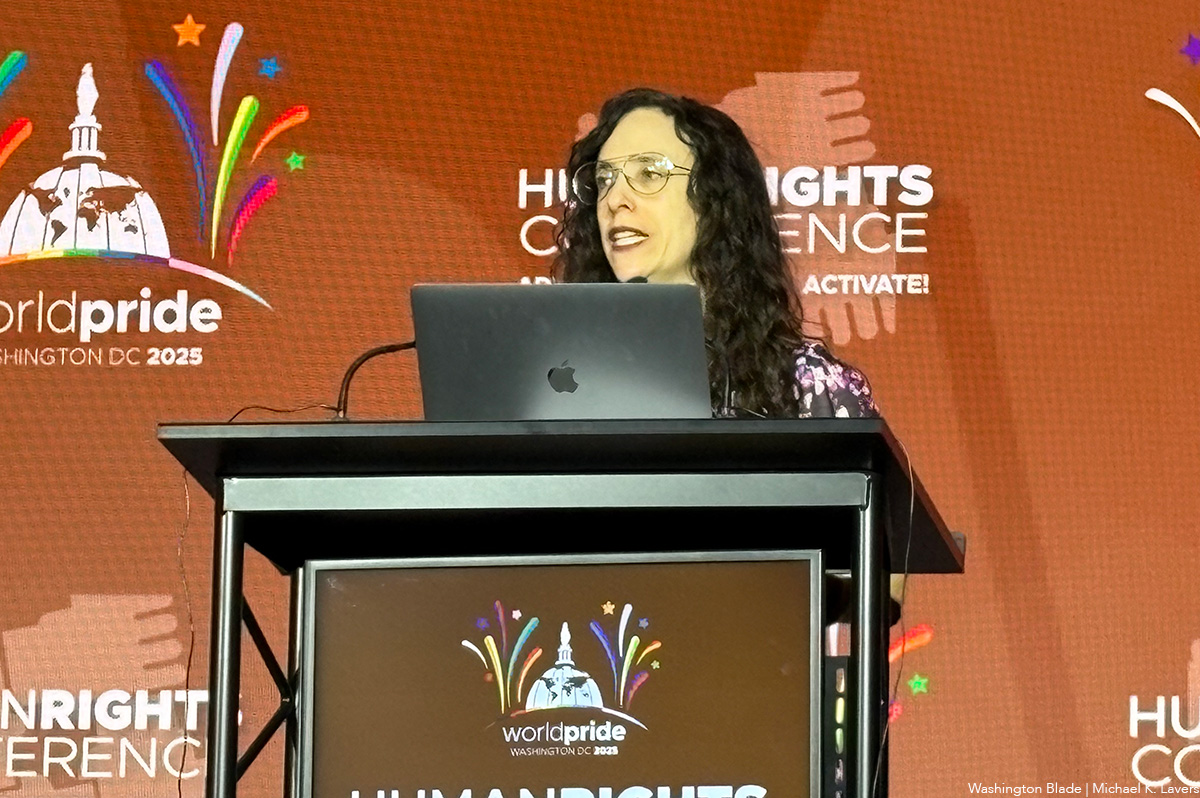
The Council for Global Equality in a statement condemned “the drastic restructuring and glaring omission of violence and abuse targeting lesbian, gay, bisexual, transgender, queer, and intersex (LGBTQI+) persons in the U.S.”
“We denounce the Trump administration’s efforts to politicize the State Department’s annual human rights reports by stripping longstanding references to human rights abuses targeting LGBTQI+ and other marginalized groups,” said Mark Bromley, the group’s co-chair.
Gay U.S. Rep. Mark Takano (D-Calif.), who chairs the Congressional Equality Caucus, echoed Bromley and Stern.
“Omitting the persecution of LGBTQI+ people from the human rights reports doesn’t erase the abuse, violence, and criminalization our community is facing around the world — it condones it,” said Takano in a statement.
“Erasing our community from these reports makes it that much harder for human rights advocates, the press, and the American people to be aware of the abuses LGBTQI+ people are facing worldwide,” he added.
Congress requires the State Department to release a human rights report each year. Foggy Bottom usually releases it in the spring.
Politico in March reported the Trump-Vance administration planned to cut “sections about the rights of women, the disabled, the LGBTQ+ community, and more” from the human rights report. State Department spokesperson Tammy Bruce, who President Donald Trump has nominated to become deputy representative at the U.N., on Tuesday during her last press briefing defended the report and the delay in releasing it.
“We weren’t going to release something compiled and written by the previous administration,” said Bruce. “It needed to change based on the point of view and the vision of the Trump administration, and so those changes were made.”
“It certainly promotes, as does our work, a respect for human rights around the globe,” added the former Fox News contributor who has described herself as a “gay woman.”
The Council for Global Equality and Democracy Forward has filed a Freedom of Information Act lawsuit. A press release notes it is “seeking the release of additional information … including any instructions provided by political appointees to strip references to abuses against LGBTQI+ persons from the reports.”
“The reports make LGBTQI+ persons and other minorities invisible and, in so doing, they undermine the human rights landscape that protects all of us,” said Bromley.
“Erasing our community from these reports makes it that much harder for human rights advocates, the press, and the American people to be aware of the abuses LGBTQI+ people are facing worldwide,” added Takano. “Failing to rectify this censorship will have real — and potentially deadly — consequences for LGBTQI+ people, including both for those who travel abroad from the U.S. and for LGBTQI+ people in countries whose leadership no longer need to worry about consequences for their human rights abuses. The State Department must reverse course and restore the LGBTQI+ section to these reports.”
A State Department spokesperson told the Washington Blade the “information included in the 2024 reports has been restructured and streamlined for better utility and accessibility, and to be more responsive to the legislative mandate for the (human rights report.)”
“The result directly addresses the reporting requirements as laid out in statute as well as being more streamlined, objective, universal, and accessible to the American public,” said the spokesperson.
The spokesperson did not comment on the FOIA lawsuit the Council for Global Equality and Democracy Forward has filed.

U.S. Citizenship and Immigration Services on Monday announced it will ensure “male aliens seeking immigration benefits aren’t coming to the U.S. to participate in women’s sports.”
The announcement notes USCIS “has clarified eligibility for certain visa categories: O-1A aliens of extraordinary ability, E11 aliens of extraordinary ability, E21 aliens of exceptional ability, and for national interest waivers (NIWs), to guarantee an even playing field for all women’s athletics in the United States.” The new policy comes roughly six months after President Donald Trump issued an executive order that bans transgender women and girls from female sports teams in the U.S.
“Men do not belong in women’s sports. USCIS is closing the loophole for foreign male athletes whose only chance at winning elite sports is to change their gender identity and leverage their biological advantages against women,” said USCIS spokesperson Matthew Tragesser. “It’s a matter of safety, fairness, respect, and truth that only female athletes receive a visa to come to the U.S. to participate in women’s sports.”
“The Trump administration is standing up for the silent majority who’ve long been victims of leftist policies that defy common sense,” added Tragesser.
USCIS in April announced it will only recognize “two biological sexes, male and female.” Trump shortly after he took office for a second time on Jan. 20 signed the “Defending Women from Gender Ideology Extremism and Restoring Biological Truth to the Federal Government” executive order.
The 2028 Summer Olympics will take place in Los Angeles.
The U.S. Olympic and Paralympic Committee last month banned trans women from competing in women’s sporting events.
The Guardian earlier this year reported the State Department ordered consular officials “to deny visas to transgender athletes attempting to come to the U.S. for sports competitions, and to issue permanent visa bans against those who are deemed to misrepresent their birth sex on visa applications.”
Germany and Denmark are among the countries that have issued travel advisory for trans and nonbinary people who are planning to visit the U.S. The warnings specifically note the Trump-Vance administration has banned the State Department from issuing passports with “X” gender markers.
“This policy update clarifies that USCIS considers the fact that a male athlete has been competing against women as a negative factor in determining whether the alien is among the small percentage at the very top of the field,” reads the USCIS announcement. “USCIS does not consider a male athlete who has gained acclaim in men’s sports and seeks to compete in women’s sports in the United States to be seeking to continue work in his area of extraordinary ability; male athletes seeking to enter the country to compete in women’s sports do not substantially benefit the United States; and it is not in the national interest to the United States to waive the job offer and, thus, the labor certification requirement for male athletes whose proposed endeavor is to compete in women’s sports.”
The new USCIS guidance takes effect immediately.
California Politics
How Triston Ezidore became the first gay, Black board member in Culver City at 19 years old, making history—twice!
At 19, Ezidore felt like it was his responsibility to track the educational movements in the Culver City Unified a bit more closely
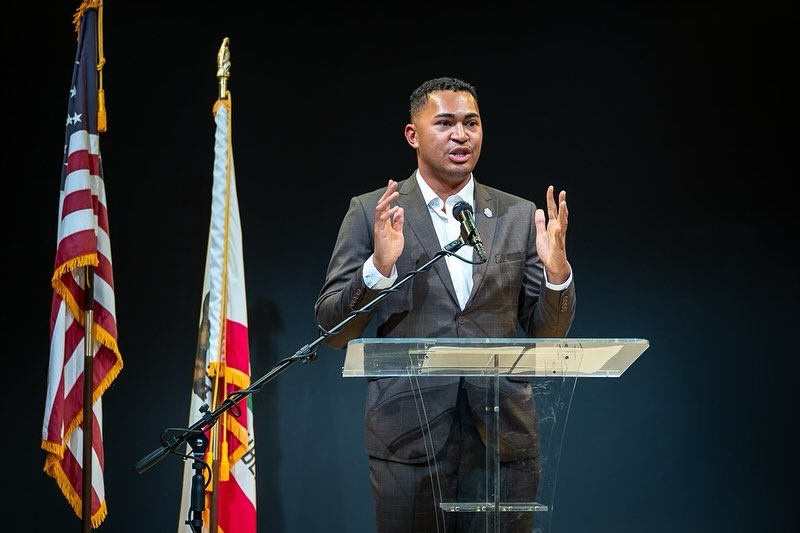
While most teenagers are busy playing video games, Triston Ezidore was busy making history.
From high school student to school board member for the Board of Education in Culver City, Ezidore talks with the LA Blade about his unconventional entry into politics with influence from George Floyd’s death and the COVID-19 pandemic, and how he made history twice while he was still a teenager.
In 2021, most of us were still at home and many people unemployed, out of school, caring for loved ones or just merely surviving the pandemic shutdowns and peak infections caused by COVID-19. During this time, many high school students lost valuable time in the classroom, being cut off from celebrating and socializing with their peers. Young Ezidore, rose above that—and more—achieving new milestones within his family and within the entire board of education in Culver City, bringing representation to queer, trans and communities of color.
Shortly after graduation, Ezidore headed to Syracuse University and from afar, he continued to tune into the Culver City school board meetings to track the progress he had made during his time as student body president in high school.
“I was still kind of watching, tuning into everything that was going on in Culver City and we knew that in order to get [the progress] right, we had to have a spotlight over the implementation,” said Ezidore.
It was during this time, that he noticed that all the progress he tried to implement during his time there, was not being implemented correctly, so he felt like it was his responsibility to track the movements a little more closely.
This is when he made the decision to return home and enroll at University of Southern California’s Dornsife College of Letters, Arts and Sciences—where he simultaneously launched his campaign for a seat on the Culver City Unified School District Board of Education.
In 2022—just one year after graduating high school—he won one of three open seats, becoming the youngest elected official in Los Angeles County at 19 years old. Then in 2023, he was elected to serve as School Board Vice President—making history as the first Black, gay man in that position as a teenager.
Though his journey into politics is “unconventional” as he puts it, Ezidore says he was radicalized to go into politics because of George Floyd’s death and the inequities made incredibly obvious by the COVID-19 pandemic.
Ezidore says that being the child of immigrants also inspired him to ultimately look into politics to gain a better understanding of how his perspective can be helpful towards other people’s experiences and educational goals.
His mother was born in Vietnam and moved to the United States after the fall of Saigon, which was the end of the Vietnam war that lasted from 1955 to 1975. Ezidore’s father is from Jamaica, so that gives Ezidore a unique perspective into the challenges and unique obstacles that many students face during their K-12 education.
Ezidore also identifies as gay and has been out since he was 18 years old.
“I find myself identifying as a gay, Black man, and I know that under this administration specifically, there has been an obsession with LGBTQ people and trans people in education,” said Ezidore. “I think historically our [education] system has not supported Black boys in education as a whole, so I find myself often pulling or tapping into those aspects of my identity.”
As a proud, gay, Black man, he felt that it was necessary to implement actual structures to support the most neglected demographic of the education system.
“We instituted the Black Student Achievement Plan that called for specific action goals to implement or to increase achievement,” said Ezidore.
This plan created mentorship and internship opportunities, a Black student council, a Black affinity group graduation and uplifted students in achieving their goals. During that time, former governor Jerry Brown stated that school districts should implement a Local Control and Accountability Plan (LACP). The plan serves as a tool to improve student outcomes with a roadmap that tracks and sets goals and plan actions, and leverages resources to guide students who were foster youth, low-income and English-learners.
“I don’t know that [Trump] is going to withhold the funding, but to me, I don’t know if I could sleep at night if I let him dictate these [educational] outcomes for the students in Culver City,” he said.
The latest update from the Supreme Court is that Trump is allowed to continue dismantling the U.S. Department of Education, worrying scholars throughout the country, with many saying that without an injunction, much of the damage can be irreversible. The Department of Education has already experienced the slashing of over 1,400 jobs and will continue to see more funding cuts due to the Reduction in Force (RIF) plan, implementing Trump’s Executive Order, which he claims will improve education and families by returning education authority to individual states.
-

 Theater5 days ago
Theater5 days ago‘Incitation to the Dance’ asks what happens to love when a younger man cuts in
-

 New York5 days ago
New York5 days agoPride flag removed from Stonewall Monument as Trump targets LGBTQ landmarks
-

 Philippines5 days ago
Philippines5 days agoPhilippines Supreme Court rules same-sex couples can co-own property
-

 Los Angeles4 days ago
Los Angeles4 days agoStonewall Young Democrats bounces back from “quiet year” with Hero Awards
-

 Florida5 days ago
Florida5 days agoDisney’s Gay Days ‘has not been canceled’ despite political challenges
-

 a&e features2 days ago
a&e features2 days agoFrom ‘So Random’ to sexy theater: LA’s very own Mathew Scott Montgomery
-

 Los Angeles2 days ago
Los Angeles2 days agoA new “queer summer camp” cycling event rises from the legacy of AIDS/LifeCycle
-

 Transgender3 days ago
Transgender3 days agoTrans-led organization FLUX celebrates a decade of “transformative” service to TGI communities
-

 Commentary3 days ago
Commentary3 days agoWhat Grindr’s pricey new subscription says about the gays, intimacy, and capitalism in the age of AI

